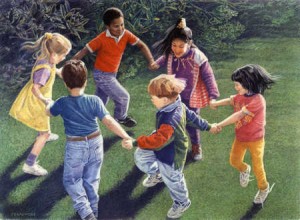Wolfboy and Princess Cupcake

The Complementarity of the Sexes
Ecumenism at its best was recently demonstrated at the Vatican, where dozens of faith leaders worldwide assembled to remind us of the essential complementarity of men and women in life, marriage, and parenthood. It was enough to prompt a high-five between Pope Francis and evangelical pastor James Robison.
Of course, do we really need reminding that male and female are different? Absolutely, especially with the advent of same-sex marriage, which is prompting assertions that it “doesn’t matter” whether two men or two women parent a household.
Ask any parent if males and females are different. My wife and I have eight children under our roof, and the boy-girl differences are dramatic.
Here’s a typical Saturday morning exchange at our house: “Daddy!” my 7-year-old son yells, running toward me in camouflage hunting clothes. “I had a dream last night that I stabbed Bigfoot nine times with a spear!” Not missing a beat, his 3-year-old sister prances and dances toward me in a flowered pink dress: “Daddy, I had a dream about a ladybug!”
The 3-year-old goes by “Princess Cupcake.” She’s of the age where she dresses up and displays herself in front of me waiting for me to gush, “Wow, you look like a princess!” She beams. Her older sisters did the same thing. The first time I said that to her oldest sister, she calmly glowed to her mom, “He said I look like a princess.”
Needless to say, the boys have never done that—not once in 20,000-plus days of combined lives.
My wife and I have nothing to do with these differences, other than providing the chromosomes.
My 7-year-old boy, long before fancying himself a Bigfoot slayer, declared himself “Wolfboy.” My wife and I certainly didn’t come up with that one. She will tell you that she did not give birth to a wolf boy. No, it was he alone who transmogrified himself into this half beast, half boy.
Wolfboy sauntered around the house creeping, preying. We attempted to keep these wild manifestations at, shall we say, bay—a more restrained Wolfboy. One day at the home of friends, he politely asked my wife if he could go outside to “howl,” to the giggles of my friend’s teenage girl.
Fortunately, the Wolfboy thing eventually cooled. One afternoon he grabbed two chopsticks for fangs, shoving them into his throat. Wolfboy had to be taken to the hospital. We’ve since had several full moons with no reappearances.
That brings me back to the differences in the sexes. These traits follow us into adulthood, marriage, and parenting. There are things my wife does that I just can’t. She happily jumps up in the middle of the night at the slightest cry. I lay there groaning. On the flip side, she has no yearning to take the teenage boys hunting in 20-degree weather with rifles and crossbows to shoot and gut and hang and skin and butcher a deer. My boys crave that, and they’re utterly mystified at their sisters’ insatiable interest in the Duggar family’s weddings.
In short, all of this is obvious, observable. Really, to deny it is to be warped by ideology, culture, politics, or some agenda.
That brings me back to the ecumenical gathering at the Vatican, where these gender differences in married and family life were acknowledged and celebrated.
“The biggest threat to marriage is that people have forgotten its purpose,” said Pastor Rick Warren, the 28th speaker at the conference. “Children who grow up with the presence of a mother and father are more successful in life, are healthier, are stronger, are less likely to be involved in crime, are less likely to go to prison, are less likely to be involved in drug abuse, are less likely to live in poverty. If you really want to support children, we need to support two-parent families, a husband and a wife, a mom and a dad.”
The bishop of Rome didn’t disagree with the Saddleback Church pastor.
“Children have a right to grow up in a family with a father and a mother,” said Pope Francis. Such households are best “capable of creating a suitable environment for the child’s development and emotional maturity.”
Of course, not all children get that ideal, but it’s an ideal our culture should strive for rather than against. We were made male and female, and from birth to death and childhood to parenthood, those differences have a distinct and complementary purpose.

